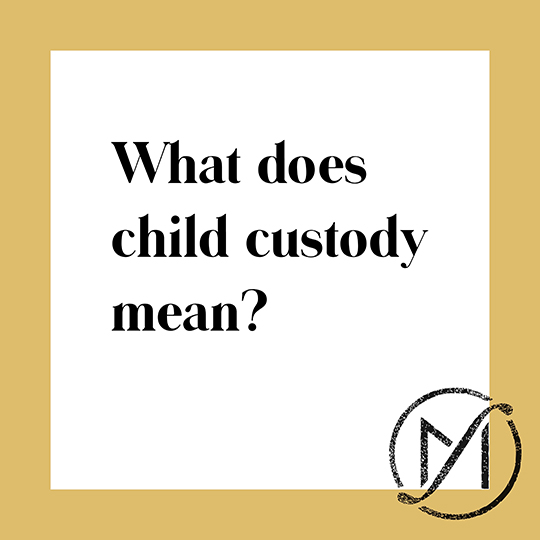What Does Child Custody Mean?

A lot of legal terminology comes into play when it comes to making custody and parenting decisions in your divorce. It’s no wonder that a common question our divorce attorneys are asked is: “What does child custody mean?”
Read on to learn more.
Child Visitation Versus Custody
The terms “custody” and “visitation” or sometimes used interchangeably, but they actually have different meanings. Custody is a broader term and can refer to either legal or physical custody, while visitation refers to time actually spent with the child.
Legal Custody vs Physical Custody
There are two types of custody: legal custody and physical custody.
- Legal custody: refers to a parent’s right to make important decisions about a child’s upbringing, such as the medical care they receive, where they go to school, and what religious faith they are brought up in.
- Physical custody: addresses where a child will live on a regular basis
Joint Custody vs Sole Custody
There are two types of joint custody: joint legal custody and joint physical custody.
- Joint Custody: what it’s called when a court orders custody of a minor child to both parents. Generally speaking, when someone refers to “joint custody” and doesn’t specify whether it’s legal or physical, it means that both are joint.
- Sole custody: when one parent alone has custody. As with joint, you can have sole legal custody, sole physical custody, or both. Just because a parent has sole physical custody doesn’t mean that the other parent doesn’t have visitation rights. Even if your ex has sole physical custody of your child, you still have parental rights. For example, there are often still child support obligations and visitation rights, even when the other parent has sole custody. In other words, not having custody of a child is not the same as having your parental rights terminated.
Third Party Custody
In Connecticut, there is an alternative to sole custody and joint custody called third party custody. Third party custody is when the court awards custody to someone other than a parent. When it comes to a custody dispute between a parent and a non-parent, there’s a presumption that it is in the child’s best interest to be in that parent’s custody. The non-parent may rebut the presumption in favor of the parent by showing that it would be detrimental to the child.
Making Changes to Custody
When the court finalized your divorce, it issued a final, enforceable divorce decree. But sometimes, some of that order doesn’t work for you and your family and there are Post Judgment child custody issues.
A Motion to Modify can be used to adjust the terms of a parenting plan or custody agreement as long as the changes are in the child’s best interests.
Some examples of reasons a parent might file a Motion to Modify custody or parenting include:
- Seeking a change from joint custody to sole custody or from sole custody to joint custody
- Seeking additional parenting time
- Hoping to relocate
- Changes to a parent’s work schedule
- Adjustments to a child’s school or activity schedule
Next Steps
For more information about Connecticut divorce and family law, check out our Divorce Information and Facts.
If you have questions or want to learn more about how our team of divorce attorneys can help you with your divorce or post judgment issue, please contact us here.








